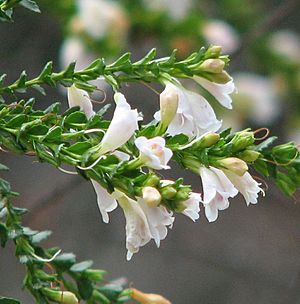Spotted eremophila facts for kids
Eremophila brevifolia, also known as spotted eremophila, is a beautiful flowering plant. It belongs to the figwort family, called Scrophulariaceae. This plant is special because it is endemic to the south-west of Western Australia. This means it naturally grows only in that part of the world.
The spotted eremophila is a tall, open, and somewhat thin shrub. It has sticky, short leaves with jagged edges, like tiny saw teeth. Its flowers are usually white or pink. You can only find this plant in a few scattered places.
Quick facts for kids Spotted eremophila |
|
|---|---|
 |
|
| Eremophila brevifolia in Maranoa Gardens, Victoria | |
| Conservation status | |
| Scientific classification |
|
| Kingdom: | Plantae |
| Clade: | Tracheophytes |
| Clade: | Angiosperms |
| Clade: | Eudicots |
| Clade: | Asterids |
| Order: | Lamiales |
| Family: | Scrophulariaceae |
| Genus: | Eremophila |
| Species: |
E. brevifolia
|
| Binomial name | |
| Eremophila brevifolia (Bartl.) F.Muell.
|
|
| Script error: The function "autoWithCaption" does not exist. | |
| Synonyms | |
|
List
Bondtia brevifolia Kuntze orth. var.
Bontia brevifolia (Bartl.) Kuntze Eremophila brevifolia F.Muell. isonym Eremophila brevifolia (Bartl.) F.Muell. var. brevifolia Eremophila brevifolia var. flabellifolia F.Muell. ex Diels Myoporum brevifolium Bartl. Pholidia brevifolia (Bartl.) Benth. Pholidia brevifolia (Bartl.) Benth. var. brevifolia Pholidia brevifolia var. flabellifolia (F.Muell. ex Diels) Kraenzl. Pseudopholidia brevifolia (Bartl.) A.DC. Pseudopholidia brevifolia (Bartl.) A.DC. var. brevifolia Pseudopholidia brevifolia var. ovalifolia A.DC. |
|
Script error: No such module "Check for conflicting parameters".
Contents
What Does Spotted Eremophila Look Like?
The Eremophila brevifolia is an upright, open, and spreading shrub. It has thin branches and usually grows up to 2 m (7 ft) tall. Its leaves grow one after another along the branches.
Leaves of the Plant
Most leaves are about 4–9 mm (0.2–0.4 in) long and 3–8 mm (0.1–0.3 in) wide. They feel sticky and are smooth, meaning they have no hairs. The leaves are shaped like a wide egg or are almost round. Their edges are serrated or toothed, like tiny saw blades.
Flowers and Fruit
The flowers usually grow one by one where the leaves meet the stem. Each flower sits on a straight stalk about 1.5–3 mm (0.06–0.1 in) long. There are five narrow, pointed green sepals, which are like small leaves that protect the flower bud. These sepals are about 2–4.5 mm (0.08–0.2 in) long and mostly smooth.
The petals are 6–11 mm (0.2–0.4 in) long. They join together at the bottom to form a tube shape. The outside of this tube is white to pale purple. Inside, it is white with yellow spots. Most of the petal parts are smooth, but the bottom part has long hairs near its base. The inside of the flower tube is also full of long, soft hairs. There are four stamens, which are the parts that produce pollen, hidden inside the petal tube.
This plant usually flowers from July to September. After the flowers, it produces fruits. These fruits are dry, oblong (like a stretched circle), and about 2.5–4.5 mm (0.1–0.2 in) long.
How the Plant Got Its Name
The Eremophila brevifolia was first officially described in 1845 by Friedrich Gottlieb Bartling. He named it Myoporum brevifolium. Later, in 1847, Alphonse Pyramus de Candolle changed its name to Pseudopholidia brevifolia. Finally, in 1859, Ferdinand von Mueller gave it the name we use today: Eremophila brevifolia.
The second part of its name, brevifolia, comes from two Latin words. Brevis means "short," and folia means "leaves." So, the name brevifolia means "short-leaved," which describes one of its features!
Where Spotted Eremophila Lives
You can only find Eremophila brevifolia in three small, separate areas in Western Australia. These areas are near Geraldton, Northampton, and Kellerberrin. It grows in specific natural regions like the Geraldton Sandplains, Avon Wheatbelt, and Jarrah Forest. This plant prefers to grow close to rivers.
Protecting This Special Plant
The Western Australian Government's Department of Parks and Wildlife has given Eremophila brevifolia a special classification: "Priority Two." This means that the plant is not very well known. It is found in only one or a few locations, so it needs special attention to protect it.
Growing Spotted Eremophila in Gardens
This plant is quite popular for gardens. Its small, delicate white flowers look lovely against its bright, shiny green leaves. It's a strong plant that can handle both frost and dry weather, making it easy to care for.
It's also easy to grow new plants from cuttings. This means you can take a piece of the plant and grow a new one from it. Eremophila brevifolia can grow in many different types of soil and in various sunny or partly shady spots.
 | James Van Der Zee |
 | Alma Thomas |
 | Ellis Wilson |
 | Margaret Taylor-Burroughs |


